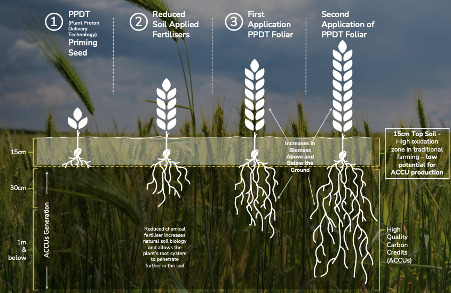RLF unlocks commercial scale soil carbon credit generation for Aussie grain industry

The company plans to kick off a large-scale (5000ha) Australian soil carbon pilot program, which may potentially offset up to 15,000 tonnes of CO2 emissions per year. Pic: Supplied
Technology-driven plant nutrition company RLF AgTech has announced the launch of RLF Carbon, focused on harnessing and monetising the soil carbon in Australia’s grain industry.
The company’s program will sequester CO2 from the atmosphere and store it in the soil for commercial farming, allowing farmers to continue growing crops at large scale whilst generating a share in Australian Carbon Credit Unit (ACCU) revenue.
It could be a game changer for farmers to receive ACCUs from growing Australia’s 23 million hectares of grain crops – while also increasing yield and reducing soil applied fertiliser.
First mover in the grain crop market
RLF AgTech (ASX:RLF) plans to kick off a large-scale (5000ha) Australian soil carbon pilot program, which may potentially offset up to 15,000 tonnes of CO2 emissions per year, and accelerate ACCU supply in the market, currently estimated at 40 million ACCUs under the Federal Government’s Safeguard Mechanism each year by 2030.
“Utilising our product technology, systems and practical on farm experience, we aim to be a first mover in the Australian grain crop market to aggregate large scale ACCU production from existing commercial farming operations,” MD and CEO Ken Hancock said.
RLF Carbon will look to have its Accumulating Carbon in Soil System (ACSS) project registered by the Australian Government’s Clean Energy Regulator as an approved Emissions Reduction Project.

Increased crop yields a bonus
Globally, the agriculture sector is seeing an increased focus on adapting farming practices to generate and monetise additional soil carbon, with farms acting as carbon sinks that capture and store carbon dioxide.
As well as actively promoting carbon sequestration in the soil, crops grown with RLF Plant Nutrition Products that contain its Plant Proton Delivery Technology (PPDT), reduces the need for soil applied fertilisers by around 20% and delivers an increase in yields of between 10% to 30%.
The RLF Carbon opportunity concentrates on the Australian grain farming sector, combining increases in both food production and carbon offsets. To date, typical registered soil carbon projects in Australia have been focused on mainly tree and pastoral crops for carbon offsets.
“With a finite amount of arable land in the world, we must look to innovative technologies to maximise farming efficiency by increasing crop yields and quality without the need to use more granular fertiliser in the soil,” Hancock said.
“RLF’s technology is critical to feeding our growing population and a key piece in helping the world achieve net zero in agriculture and sustainable farming practices.”
This article was developed in collaboration with RLF AgTech, a Stockhead advertiser at the time of publishing.
This article does not constitute financial product advice. You should consider obtaining independent advice before making any financial decisions.
Related Topics
UNLOCK INSIGHTS
Discover the untold stories of emerging ASX stocks.
Daily news and expert analysis, it's free to subscribe.
By proceeding, you confirm you understand that we handle personal information in accordance with our Privacy Policy.








